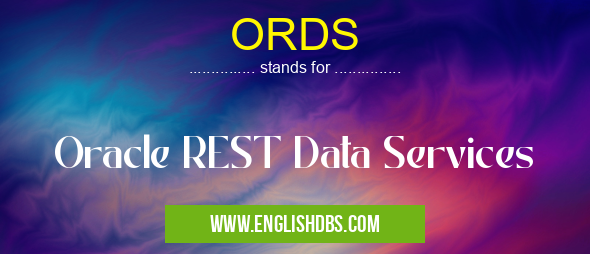What does ORDS mean in UNCLASSIFIED
Oracle REST Data Services (ORDS) is an Oracle Database technology that enables users to create secure, scalable, and high-performance REST-based services for data stored in Oracle databases. It enables a broad range of clients to send requests and receive responses from the Oracle Database over HTTP and HTTPS protocols. ORDS converts the requests into the right Oracle Database operations, like SQL queries or stored procedures, and sends back responses in a format that can be processed by client applications such as web browsers or mobile apps. This makes it easy for developers to create applications that access information stored in an Oracle database. ORDS brings together all the components needed for creating secure REST-based services from an Oracle Database.

ORDS meaning in Unclassified in Miscellaneous
ORDS mostly used in an acronym Unclassified in Category Miscellaneous that means Oracle REST Data Services
Shorthand: ORDS,
Full Form: Oracle REST Data Services
For more information of "Oracle REST Data Services", see the section below.
What does ORDS Stand For?
ORDS stands for Oracle REST Data Services.
What is ORDS?
Oracle REST Data Services (ORDS) is a Java EE-based server component that enables users to create secure, scalable, and high-performance REST-based services for data stored in Oracle databases. It provides support for a broad range of clients including web browsers and mobile applications, making it possible for developers to quickly build powerful and flexible applications that can access data stored in an Oracle database. ORDS also offers enhanced security features such as SSL/TLS encryption, authentication with user accounts, role-based authorization, and more. Finally, it provides scalability through clustering support so that applications can run efficiently on multiple servers both locally and across distributed systems.
Benefits of ORDS
The benefits of using ORDS include increased flexibility when creating applications using different types of clients, enhanced security features such as SSL/TLS encryption, authentication with user accounts and role-based authorization; scalability through clustering support; and performance optimization through caching capabilities. Additionally, the use of ORDS makes development faster by providing tools which automate common tasks such as setting up web services or generating client code libraries so developers don’t have to spend time writing code themselves. Finally, as an added bonus, there are no additional licensing fees involved in using ORDS since it is part of the standard installation package included with most versions of the Oracle Database product family.
Essential Questions and Answers on Oracle REST Data Services in "MISCELLANEOUS»UNFILED"
What is Oracle REST Data Services?
Oracle REST Data Services (ORDS) is an application that enables you to manage and deploy RESTful data services from Oracle Database. ORDS allows you to create, manage, and access data in your database through Representational State Transfer (REST) protocols such as HTTP POST/GET/PUT/DELETE and Hypertext Transfer Protocol Secure (HTTPS) POST/GET/PUT/DELETE.
How do I use ORDS to manage my database?
ORDS provides a web-based user interface that allows you to manage your database by creating, updating, and deleting data. You can also use ORDS’s SQL support to query and manipulate data in your database. Additionally, ORDS provides a variety of other features such as security options, authentication methods, custom API endpoints, caching of data returned from the API calls, and more.
What are the benefits of using Oracle REST Data Services?
By using Oracle REST Data Services, you can easily access and manipulate data from your database with ease. Additionally, ORDS also provides a variety of other features like security options for added protection, authentication methods for users’ identity management, custom API endpoints for specific operations on the database such as signing up new users or processing payments etc., caching of data returned from the API calls for faster response times when multiple requests are made against same resource at once. All these features make it extremely beneficial organization wide.
Does Oracle REST Data Services require additional installation?
No - Oracle Rest Data Service does not require any additional installation or configuration steps apart from what is provided out-of-the box by Oracle Database itself. In order to make use of this feature all one needs is already present on their network – A working copy of Oracle Database 12c or later version along with its client software installed.
Does using a cloud based offering improve my experience with ORDS?
Yes; cloud based offerings provide many benefits to enterprises looking to leverage the full potential of ORDS such as enhanced performance due to scalability contingent upon demand fluctuations throughout peak usage hours; ability to monitor system performance & trends via graphical reporting dashboards; secure hosting with no hardware or software maintenance hassle; built-in failover capabilities in case primary server fails etc.
Are there any limitations when using Oracle REST Data Services?
Currently there are no major limitations imposed on businesses leveraging ORDS both in terms of architecture or feature set wise out-of-the box. However certain features are not currently available within this solution e.g.: Muliple Database Support (currently only one), High Availability setup etc.
Final Words:
Oracle REST Data Services (ORDS) is a powerful tool used by developers to quickly build efficient applications which interact with information stored in an Oracle database securely over HTTP or HTTPS protocols. It provides several key benefits including increased flexibility when developing applications using different types of clients; enhanced security features; scalability through clustering support; performance optimization through caching capabilities; development speedup due to automation functions; and no additional licensing fees are required thanks to its inclusion in most versions of the Oracle Database product family.
